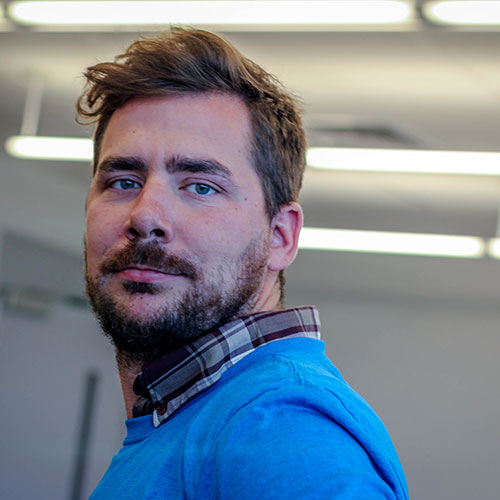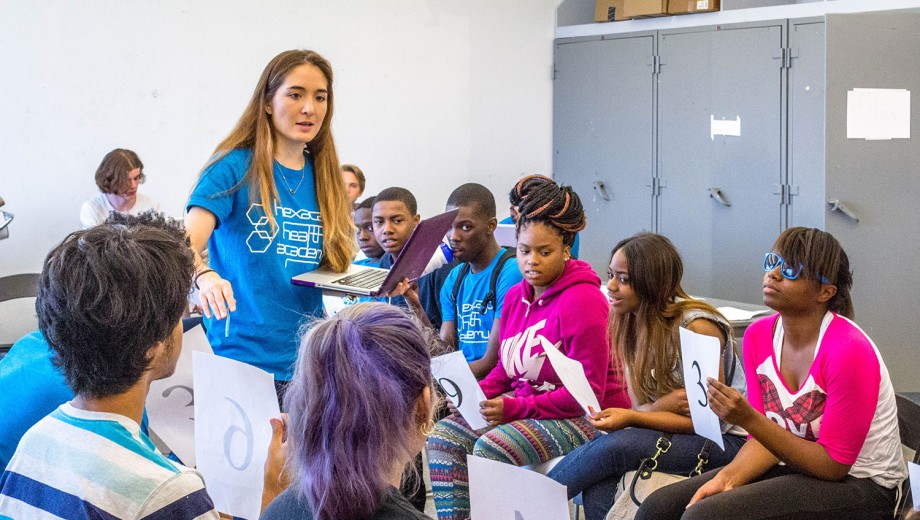For Peter McDonald, play is the thing. A third-year graduate student in English Language and Literature, McDonald’s doctoral research focuses on the cultural meaning of play, touching on gambling, video games, the Fluxus art movement—even children’s lit classic The Phantom Tollbooth. He also gets to spend part of his summers playing and designing games with junior high and high school students—a benefit of being a graduate fellow at the Game Changer Chicago Design Lab.
Founded in 2012 by Patrick Jagoda, assistant professor of English Language and Literature, and Melissa Gilliam, professor of Obstetrics and Gynecology in the University’s Pritzker School of Medicine, Game Changer has grown rapidly. Early support from the Division of the Humanities and the Neubauer Collegium for Culture and Society gave the lab resources to recruit student fellows, and recent $1 million grants from the MacArthur Foundation and the National Institutes of Health have accelerated its efforts to create and test board games, video games, and transmedia experiences that blur the line between fiction and reality. These games are designed to help 13- to-18-year-olds explore sensitive topics, such as sexually transmitted infections and transgender issues, addressed in the game Lucidity, or enliven boring ones, like health care access and AP biology test preparation through The Black Box.
The graduate student fellows, according to Jagoda, “are the research and design engine of the lab,” where they can flex skill sets from their prior professional lives.
 Before UChicago, for example, McDonald was a 3-D artist in the gaming industry. As a Game Changer fellow, he’s published with Jagoda in Hyperrhiz, a journal on new media criticism; helped to create and stage an alternate reality game; and led a project called Processing Play, which seeks to understand the basic tactics of existing games in order to design new ones. All of this has surprised him. “I wasn’t expecting to do lab work or creative work,” McDonald says of graduate school. He’d never even heard of alternate reality games until he was part of one at UChicago, and was delighted to have the opportunity to publish with a faculty member.
Before UChicago, for example, McDonald was a 3-D artist in the gaming industry. As a Game Changer fellow, he’s published with Jagoda in Hyperrhiz, a journal on new media criticism; helped to create and stage an alternate reality game; and led a project called Processing Play, which seeks to understand the basic tactics of existing games in order to design new ones. All of this has surprised him. “I wasn’t expecting to do lab work or creative work,” McDonald says of graduate school. He’d never even heard of alternate reality games until he was part of one at UChicago, and was delighted to have the opportunity to publish with a faculty member.
It’s not all play in Game Changer. Fellow Megan Macklin, a fourth-year Comparative Literature graduate student, runs the program’s youth-initiated mentoring component, which encourages high school participants to actively seek out role models who can help them advance academically and professionally. “We really just want students to be advocates for themselves,” says Macklin, who leans on a background helping low-income students prepare for college.
Macklin has also found inspiration in her Game Changer experiences and plans to dedicate a chapter of her dissertation on young adult fiction to “game metaphors and game structures, because that’s something that’s really prevalent, especially in contemporary YA,” she says, citing the popularity of The Hunger Games as an example.
Like McDonald, who calls the combination of creative work and research he’s done through Game Changer a “huge boon,” Macklin hopes to stay in academia. “My relationship to the academy is a teaching one,” she says. “So whatever I do, I hope I'll have that practical hands-on experience working with students.”

